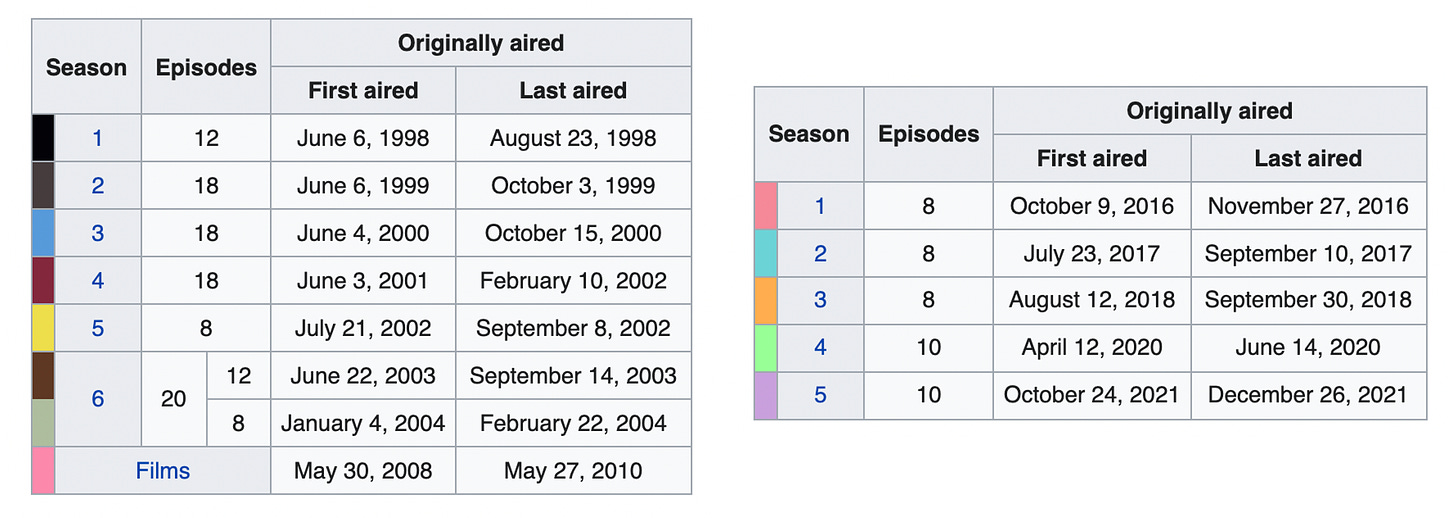Week-to-Week: When in the World is Your Favorite TV Show Premiering?
On the vagueness of scheduling in the streaming era
Ever since I accidentally became the editor of a website devoted to television criticism, I’ve been hyper-aware that it has become increasingly difficult to understand when a given show will be premiering. When setting the fall schedule, I’ve had to take on some guesswork for shows that are likely less than two months away from premiering—The White Lotus’ second installment, for example, debuts on October 30, but that date was only officially confirmed by HBO in the last week of September, after being given a vague “October” window back in early August (which I used to suss out the likely date for the start of our coverage). And when HBO debuted the first teaser trailer for their upcoming adaptation of The Last of Us—which I’ll be reviewing here at Episodic Medium—they simply indicated it was coming in “2023,” which is even less precise than the “early 2023” Casey Bloys gave to The Hollywood Reporter in July.
To be fair, HBO has historically provided fairly short windows on release dates: His Dark Materials’ second season, for example, was formally dated for November 16, 2020 just 37 days before, which is comparable to the White Lotus announcement. Accordingly, it’s not surprising that I basically had to guess when that show’s third season was going to be debuting—it’ll probably be around the same early-to-mid November slot—when scheduling out the coming months.
But if we extend to the larger TV ecosystem, across the board there’s very few premiere dates or even clear premiere windows set out for a range of late 2022-early 2023 projects. Mythic Quest remained an entirely vague “Fall 2022” until last week’s November 11 dating for instance, and while The Mandalorian’s third season got slotted for sometime in the month of February, Marvel’s Secret Invasion is just “Early 2023.” The Mandalorian and Mythic Quest are also notable for being shows that have missed their typical release windows: after twice debuting as a fall show, The Mandalorian has bumped to winter, while Mythic Quest has now debuted seasons in February, May, and either November or December..
In a tweet a couple days ago, Michael Collado—who joined me to talk about So Help Me Todd last week—lamented how our current era has disrupted the idea of feeling like we understand when a given series will debut new episodes.

There’s no simple answer to what this current era feels so disrupted temporally, but exploring this question is an interesting exercise to connect some of the dots of what’s happening with scheduling in the television industry, as well as raise some questions for its future.
First and foremost, to some degree this disruption is inherent to the advent of cable and then streaming, disconnecting a show’s debut from the rigidity of the broadcast ad sales season. While basic cable channels still rely to an extent on ad revenue, and thus to a certain degree a form of ritualized scheduling, premium cable and streaming are focused solely on subscriber revenue, meaning that a show missing a planned release window doesn’t necessarily come with the same consequences. But even within those frameworks, there’s no question that shows are moving around the schedule more than before: here, for instance, is the seasonal release pattern of Sex and the City compared with Insecure.
In the latter case, we seem to run into another key variable that explains a lot of what’s going on: COVID. Obviously, the pandemic disrupted production schedules for a wide range of shows, which pushed seasons that were meant to be produced in the summer of 2020 back several months, and increased the time necessary for production and post-production, creating lengthier windows between seasons for a range of shows. But notably, Insecure’s fourth season was actually the furthest delayed from a traditional pattern, and the show ultimately debuted seasons in three different windows: two seasons in summer, two seasons in fall, and one season in spring. Compare that to Sex and the City, which debuted every season in June until it split its final season into two parts.
That Insecure delay was because of Issa Rae’s mutli-hyphenated commitments, which was the same reason Barry was off the air for three years, and why Donald Glover went four years between seasons of Atlanta. In cases like these, valued creators are given extra time in a way they might not have been given twenty years earlier, and it’s interesting to think about what’s changed. Is it that social media has given networks and channels clearer marketing spaces to alert viewers when a show will be returning? Is it that longer hiatuses now give more viewers time to catch up on past seasons, thus building the potential audience for a show? Do they just want to get an extra promotional cycle out of a “release date reveal?” Or is it that in an age of Peak TV, there’s so much content that few shows are true “anchors” to a channel’s lineup, meaning that it’s easier to justify pushing release dates around the schedule?
Another huge factor when considering the lack of release dates we’re seeing is that television is far more complex than it was twenty years ago. The number of series that are relying on huge amounts of visual effects work is growing, and I imagine that makes a potential release date for a show like The Last of Us a moving target. These were problems that previously didn’t really apply to television compared with movies, but it’s probably the core reason why Secret Invasion doesn’t have a release date, and why we have no idea when Stranger Things—which went three years between seasons 3 and 4, only in part due to COVID—will be back for Season 5.
It’s notable, though, that longer delays between seasons has become the norm with “blockbuster” television shows, while the same has historically not been the case for feature films, which are more likely to crunch their visual effects artists and rush to make release dates.1 While delays or release shuffles have plenty of precedent, the rigidity of film scheduling comes from the greater weight attached to both marketing and competition. Elements like toy licensing, brand tie-ins, and theater partnerships are critical to a film’s release, all of which are set months if not years in advance.
This means that a film missing a given weekend could completely reshape its chances at success, whereas while Netflix or Disney+ might need to rethink some broader scheduling to account for the absence of a given tentpole and avoid subscriber churn, there’s less riding on the need to hit a singular weekend. And so if The Mandalorian is still in post-production and unsure if they’re going to deliver for early or late February, they can play it by ear into the new year, likely aiming to have the new Funko Pops in retailer hands early in the month and adjusting the street date as necessary. Giving us a precise date isn’t really necessary in the way it is for film, provided that it manages to hit a vague window.
However, I do wonder if the fact that more and more streaming services are introducing ad-supported tiers means that there will potentially be additional pressure for shows to hit certain release windows. Netflix and Disney+ have historically only been concerned about subscriber churn, but they’re suddenly going to be in the ad sales business starting later this year. Will there now be greater pressure for big returning shows on these services to hit certain release windows when advertising interest is higher, potentially creating a greater sense of regularity in series scheduling? Or will the sheer volume of content across these services more or less ensure that there’s always another tentpole to slot in, thus allowing something like the MCU series to keep being flexible in a way the feature film releases aren’t?2
And will it keep a platform like Netflix from doing something like what it’s done with its reboot of The Mole, which debuts this Friday but only announced its release date 17 days earlier? Netflix continues to have faith that its algorithm is capable of delivering people to the content they’re interested in, but such a short cycle for a show with a built-in fanbase is sort of inexplicable, and feels like a dereliction of duty. I’ve seen the first five episodes, and I’m going to be writing about it a bit on Saturdays—it’ll air over three weeks—because I’m glad to have the show back and intrigued to chat with others about it. But it’s just the latest reminder that when TV is happening feels more chaotic than ever, and whether the arrival of ads changes that will be something to explore in the months ahead.
Episodic Observations
So, in terms of The Mole, I feel pretty similarly to Joe Reid that it’s a thrill to have the basic dynamics of the show back on television, which really creates an incredibly dynamic experience. But I’ll have some thoughts on how the show is using episodic breaks, and I’m still unsure of what the audience participation piece is going to look like since the QR code they threw up in the screeners didn’t seem to be active yet. But if you’re at all a fan of the original or of reality competition programming generally, the five episodes will be worth your time, and do come back and discuss on Saturday.
I didn’t get a chance to put up a Cultural Discussion while I was away for the weekend, but Reservation Dogs finished its second season, and I can safely say that I again fell behind, just as I did in the first season, and frankly with so many FX shows over the past few years. As I told Phil Maciak on Twitter recently, I struggled to find a proper headspace for the show when I’d sit down to catch up, but I absolutely intend to before the year is done.
That Great British Baking Show bread week was a top-to-bottom abomination outside of the technical, and everyone responsible needs to take a deep look in the mirror and think about what they’ve done to the concepts of pizza and cake.
I tweeted about this, but I’ve been hate-watching the “Risky Business” spinoff of HGTV’s Good Bones, which has been a hilarious effort for Mina to suddenly be running a high-stakes business building a boutique hotel and event space. The show has gradually pivoted to more personal content for her as her mother steps away from the business, but this has been a true farce, complete with a financial crisis that nearly forces her to sell one of her numerous investment properties—how relatable!—and then a friend who randomly moves her wedding day up to create a forced timeline crunch for narrative purposes. Just embarrassing for all involved, and I won’t miss an episode.
Notably, Game of Thrones didn’t manage to miss an April premiere date until its final seasons, which is really kind of remarkable in hindsight. By comparison, House of the Dragon is likely already going to fall behind the late summer release window with its second season.






Thank you for letting me know The Mole was coming back. I feel that it was terribly marketed - and I feel like the algorithm truly doesn’t understand me, since I didn’t know about it until this post. I think it does a great job of minimizing the reality show nonsense and maximizing the amount of game. Corbin Bernsen losing his mind on two separate seasons of Celebrity Mole is still an all-time reality TV highlight. I hope this can stick the landing.
I've grown very accustomed to checking https://www.metacritic.com/feature/tv-premiere-dates for this very reason! I miss annual release schedules